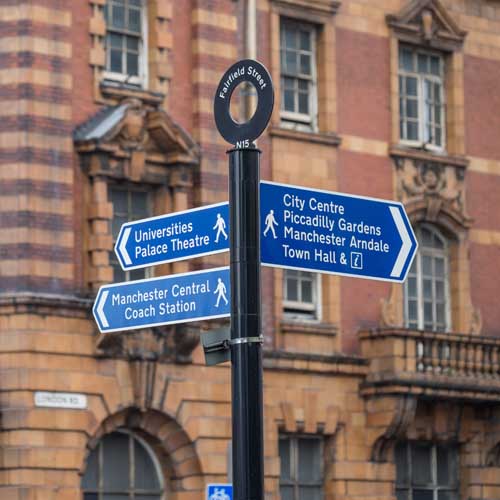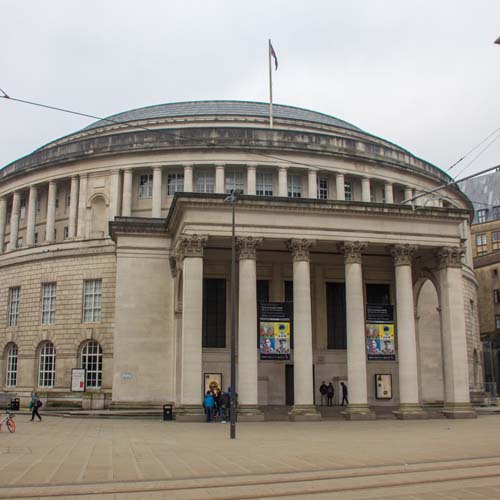Manchester’s music scene has played a significant role in shaping the city’s cultural identity and has had a significant impact on the global music industry. The city has been home to a diverse range of musicians and genres, including punk, post-punk, Britpop, electronic, and indie rock.
Manchester’s music scene has been an important force in shaping the city’s cultural landscape and has had a significant impact on the global music industry. Its influence continues to be felt today, with new artists and genres emerging from the city’s vibrant music community. Below are some of the most iconic bands that Manchester has brought the world.
If you would like to learn more about Madchester music we touch upon this in our tour, but if you would like the full Madchester Tour experience check out our sister site Rock ‘n Goal Manchester!
Joy Division
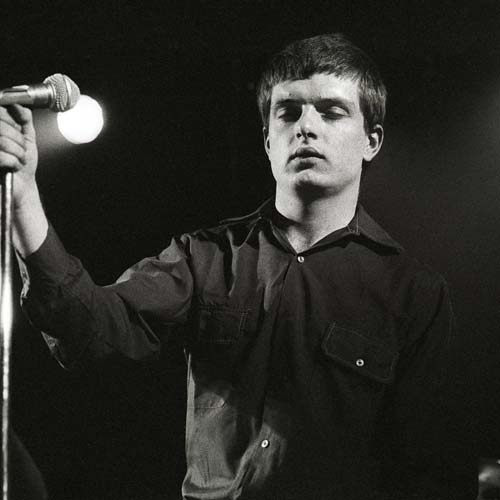
Joy Division was a post-punk band from Manchester, England, formed in 1976. The band consisted of Ian Curtis (vocals and guitar), Bernard Sumner (guitar and keyboards), Peter Hook (bass guitar), and Stephen Morris (drums). Joy Division’s music was characterised by Curtis’s distinctive baritone vocals, Hook’s basslines, and Morris’s powerful drumming. The band’s dark and melancholic sound, combined with Curtis’s introspective lyrics, made them one of the most influential bands of the post-punk era.
Joy Division’s association with Manchester is closely linked to the city’s music scene in the late 1970s and early 1980s. Manchester was a hotbed of musical activity at the time, with a thriving punk scene that included bands like Buzzcocks and The Fall. Joy Division emerged from this scene, playing their first gig at the Electric Circus in Collyhurst, Manchester in 1977. The band quickly gained a reputation for their intense live shows and unique sound, and they soon became one of the most talked-about bands in the city.
Manchester’s influence on Joy Division’s music is evident in their early recordings, which feature the raw, DIY sound of the city’s punk scene. However, as the band’s sound evolved, they began to incorporate more experimental and electronic elements, reflecting Manchester’s growing interest in dance music and electronic music.
Joy Division’s connection to Manchester is also evident in their lyrics. Many of the band’s songs deal with the bleakness and despair of life in the city, as well as the sense of isolation and alienation that many young people felt at the time. This was especially evident in the 70’s and 80’s. Manchester is barely recognisable today in comparison with yesteryear with its skyscrapers, trendy bars and restaurants. Curtis’s lyrics, in particular, capture the mood of Manchester in the late 1970s and early 1980s, painting a vivid portrait of a city in flux.
One of Joy Division’s most famous songs, “Love Will Tear Us Apart,” is a perfect example of this. The song is a haunting meditation on love and loss, with Curtis’s lyrics capturing the sense of hopelessness and despair that many young people felt in Manchester at the time. The song has become an anthem for a generation of music fans, and it remains one of the most iconic songs of the post-punk era.
Joy Division’s association with Manchester has also had a lasting impact on the city’s music scene. The band’s success helped to put Manchester on the map as a centre of musical innovation and experimentation, paving the way for other iconic Manchester bands like The Smiths and New Order who formed after the death of Joy Division frontman Ian Curtis.
Today, Joy Division remains a beloved and influential band, with their music continuing to inspire new generations of fans. The band’s connection to Manchester remains as strong as ever, with their legacy still felt throughout the city’s vibrant music scene.
New Order
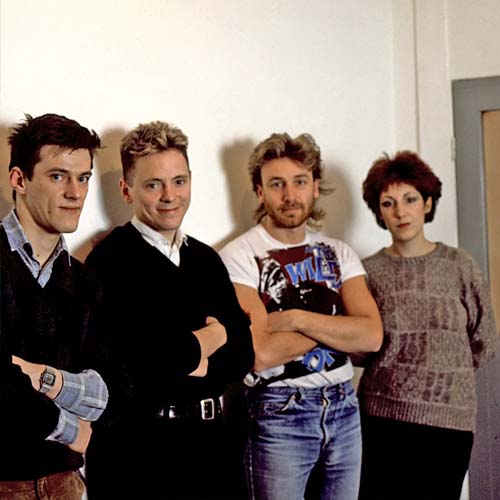
New Order is one of the most important bands in the history of Manchester music. Formed in 1980, the band emerged from the ashes of the legendary Manchester band Joy Division, following the death of their lead singer Ian Curtis. The band consisted of Bernard Sumner, Peter Hook, Stephen Morris, and Gillian Gilbert.
New Order’s music was a unique blend of post-punk, electronic, and dance music, and their sound was heavily influenced by the emerging dance scene in Manchester at the time. Their early singles, including “Ceremony” and “Temptation”, were instant classics, and their debut album, “Movement”, was a critical and commercial success.
New Order’s association with Manchester was strong from the very beginning. The band was signed to the legendary Manchester record label Factory Records, which was run by the equally legendary Tony Wilson. Factory Records played an important role in the development of the Manchester music scene, and its influence can still be felt in the city today.
New Order’s relationship with Factory Records was not always plain sailing, however. The band famously fell out with Tony Wilson over financial issues, and the dispute ultimately led to the band leaving the label.
Despite this setback, New Order continued to be a major force in the Manchester music scene throughout the 1980s and 1990s. They played a key role in the development of the city’s dance music scene, and their music was an important influence on many of the city’s most famous DJs and producers.
New Order’s impact on the Manchester music scene can still be felt today. Their music continues to be celebrated and played in clubs across the city, as well as every other city in the UK, and their legacy has inspired countless musicians and fans.
In addition to their music, New Order was also known for their distinctive visual style. The band’s album artwork, promotional materials, and music videos were all characterised by their minimalist and stylish design. In fact it was their desire to display the band’s creative side that would cost them, literally. Blue Monday was released as a 12-inch single on 7th March 1983 the record sleeve looked like a mini disk which was en vogue at the time. However the artwork for each record cost so much that every time someone bought the record it would cost New Order and Factory Records money. Blue Monday was an instant hit with radio pluggers and it became the biggest selling 12-inch of all time.
World in motion in 1990 could easily go down in music history as one of, if not The best football songs of all time. Sang along with the England football team to promote their triumphs it showed support for the England side that were competing in the World Cup Finals in Italy. Featuring the silky skills of John Barnes rapping the song was the first number one for New Order in the UK single charts.
Today, New Order remains one of the most important bands in the history of Manchester music. Their association with the city is a source of pride for both the band and the city itself, and their legacy as cultural pioneers continues to inspire new generations of artists and fans.
The Smiths
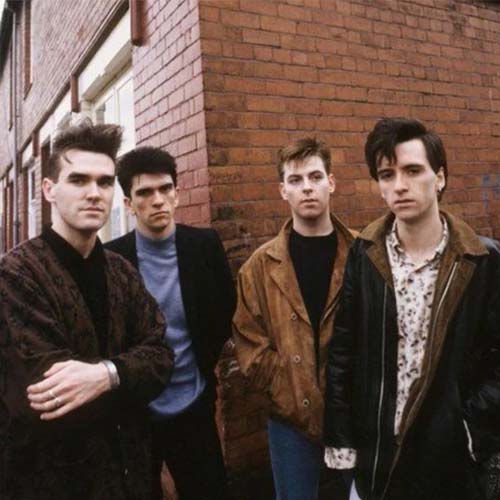
The Smiths were one of the most iconic and influential bands of the 1980s, and they are closely associated with the city of Manchester. Formed in 1982, the band consisted of singer Morrissey, guitarist Johnny Marr, bassist Andy Rourke, and drummer Mike Joyce.
The Smiths’ sound was a unique blend of Morrissey’s distinctive vocals and Marr’s jangly guitar riffs, combined with Rourke and Joyce’s tight rhythm section. Their songs were often characterised by Morrissey’s melancholic and witty lyrics, which tackled themes of alienation, disillusionment, and the struggles of working-class life.
Although the band’s success was short-lived (they disbanded in 1987), their influence on the Manchester music scene was significant. The Smiths were part of a wave of bands that emerged from the city in the early 1980s, and they helped to establish Manchester as a hub for alternative music.
The Smiths were closely associated with the Manchester music venue, The Haçienda, which played an important role in the city’s music scene. They played their third gig and first with the line up we now know after Andy Rourke replaced Dale hibbert at the club. “Handsome Devil”, recorded at The Haçienda on 4 February 1983 was the B side of “How Soon Is Now?” in 1992 following the acquisition of the Rough Trade catalogue by Warner Bros. Records.
The band’s impact on the Manchester music scene was also felt beyond the city. Their music resonated with young people across the UK, and their popularity helped to establish Manchester as a cultural centre that was distinct from London and other major cities.
The Smiths’ legacy continues to inspire new generations of musicians and fans. Their music has been covered by numerous artists, and their influence can be heard in the work of many contemporary indie bands.
In addition to their music, The Smiths were also known for their distinctive style. Morrissey’s trademark quiff and dandyish fashion sense, as well as the band’s album artwork and promotional materials, were all part of their distinctive image.
Despite their relatively short career, The Smiths remain one of the most influential bands in the history of British music. Their association with Manchester continues to be a source of pride for the city, although Morrisey’s opinions less so, and their legacy as cultural pioneers continues to inspire new generations of artists and fans alike.
The Stone Roses
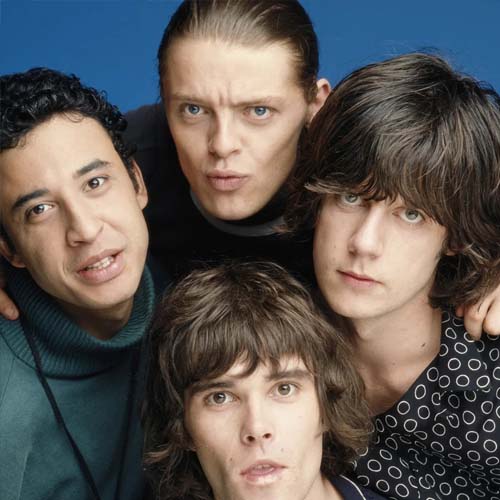
The Stone Roses are one of the most important and influential bands to come out of Manchester. Formed in 1983, the band consisted of singer Ian Brown, guitarist John Squire, bassist Mani, and drummer Reni.
The Stone Roses’ sound was a unique blend of psychedelic rock, indie pop, and dance music, and their music was heavily influenced by the emerging Manchester music scene at the time. Their eponymous debut album, released in 1989, was a critical and commercial success, and it remains one of the most iconic albums of the era.
The Stone Roses’ association with Manchester was strong from the very beginning. The band was part of a wave of Manchester bands that emerged in the 1980s, and they helped to establish the city as a hub for alternative music.
The band was closely associated with the Manchester music venue The Haçienda, which played an important role in the city’s music scene. They played several gigs at the club, and their music was a regular feature on the club’s playlist.
The Stone Roses were also known for their distinctive style. The band’s album artwork, promotional materials, and music videos were all characterised by their bold and colourful design, which was heavily influenced by the psychedelic and rave cultures of the time.
The band’s impact on the Manchester music scene was significant. They inspired countless musicians and fans, and their music continues to be celebrated and played in clubs across the city and the rest of the country.
Despite their success, The Stone Roses were not without their controversies. The band famously fell out with their record label, Silvertone Records, over financial issues. Realising they were tied to a contract which they attempted unsuccessfully to escape, in a Jackson Pollock style they threw paint all over the offices of Silvertone, their cars and the car owners. They went on to sign with Geffen Records.
The band also had a tumultuous relationship with the press, with Ian Brown and John Squire in particular being known for their combative interviews and public feuds.
Second Coming released in December 1994 was given a lukewarm response, especially by the press and after an unwanted and lengthy hiatus maybe it will have been difficult, if not impossible to connect the same way as when they had the enthusiasm of their debut album to celebrate as part of what was a thriving Madchester scene. After becoming a gardener and completely turning his back on the music industry Ian Brown was persuaded, eventually, by a friend to get back into music. Brown then gave the world a string of solo albums before the band reformed in 2011 and played some iconic gigs at Heaton Park near Mani’s neck of the woods. Nottingham film director and huge fan of the band Shane Meadows was allowed behind the scenes to create the documentary The Stone Roses: Made of Stone, released in 2013.
Despite their setbacks, The Stone Roses remain one of the most iconic and influential bands in the history of Manchester music. Their association with the city continues to be a source of pride for both the band and the city itself, and their legacy as cultural pioneers continues to inspire new generations of artists and fans alike.
Oasis
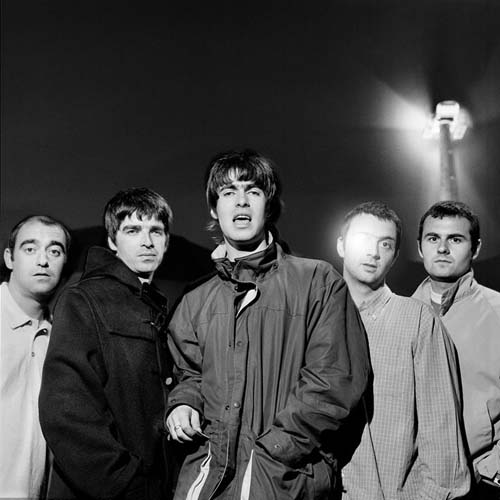
Oasis is one of the most iconic bands to come out of Manchester, England. Formed in 1991, the band consisted of brothers Liam and Noel Gallagher, along with Paul “Bonehead” Arthurs, Paul “Guigsy” McGuigan, and Tony McCarroll. They quickly rose to fame in the mid-1990s with their unique brand of Britpop, becoming one of the biggest bands in the world and cementing their association with Manchester’s music scene.
Oasis was heavily influenced by Manchester’s musical heritage, drawing inspiration from bands like The Stone Roses, Joy Division, and The Smiths. In fact after watching The Stone Roses perform at The Hacienda Liam Gallagher decided to start a band with his mate Tony McCarroll on drums. Their sound was characterised by Liam Gallagher’s distinctive vocals, Noel Gallagher’s catchy guitar riffs, and a driving rhythm section that propelled their anthemic songs.
The band’s association with Manchester began in the early 1990s, when they played their first gigs at local venues like The Boardwalk and marked the release of their debut album Definitely Maybe with a Hacienda gig. Released in 1994 and produced by Owen Morris, Definitely Maybe became the fastest selling British debut album. The album was an instant success, debuting at number One on the UK album charts and earning critical acclaim for its raw, energetic sound. The album spawned several hit singles, including “Live Forever” and “Supersonic,” and helped to establish Oasis as one of the most important bands in the UK.
Oasis’s association with Manchester continued throughout their career. They played several iconic gigs in the city, including a now-legendary performance at Maine Road, the former home of Manchester City Football Club. The gig, which took place in April 1996, was attended by more than 40,000 fans and is widely regarded as one of the best gigs in the band’s history.
The stool that Bonehead sat on when he played his acoustic set on that famous night sit in Johnny Roadhouse on Oxford Road, Manchester. Also in the shop are some signed guitars from Oasis, The Stone Rose, 808 State and others. Oasis used to buy their instruments and other music gear from Johnny Roadhouse which also has a guitar signed by Paul McCartney inside. The Beatles were also an obvious influence on their music.
Oasis’s influence on Manchester’s music scene has been huge with a swathe of guitar bands playing in the local grassroots venues for years to come aspiring to emulate their success. They helped to put the city back on the map as a centre of guitar bands and creativity, following in the footsteps of other iconic Manchester bands like Joy Division and The Stone Roses. Their association with the city helped to create a sense of identity and pride among Manchester’s music fans, and their music continues to be celebrated in the city to this day.
While Oasis disbanded in 2009, their legacy lives on in Manchester and around the world. They have inspired countless bands and musicians, and their music continues to be a staple of rock radio and pub jukeboxes everywhere. Their association with Manchester will always be a powerful one, and they will forever be remembered as one of the most important bands to come out of the city.
Noel Gallagher’s High Flying Birds is the title of the eponymous album of former guitarist and backing vocalist of Oasis Noel Gallagher. Released in 2011 he’s since given us a few other albums and played at lots of festivals around the world.
Liam Gallagher went straight into a project that saw Beady Eye give the world a few albums before disbanding in 2014. Maybe it was too early to come back with a vengeance but that is exactly what Liam has done with the commercial success of his three solo albums. Liam returned to perform at Knebworth on the 3rd and 4th June 2022 after playing there with Oasis on 10th and 11th August 1996.
Conclusion
As you can see, Manchester music has had a profound impact on the world, influencing countless musicians and shaping popular culture in countless ways. Manchester’s influence on music has continued to this day, with the city continuing to produce exciting and innovative new bands and musicians.
So tell us, who is your favourite Manchester band and why?

